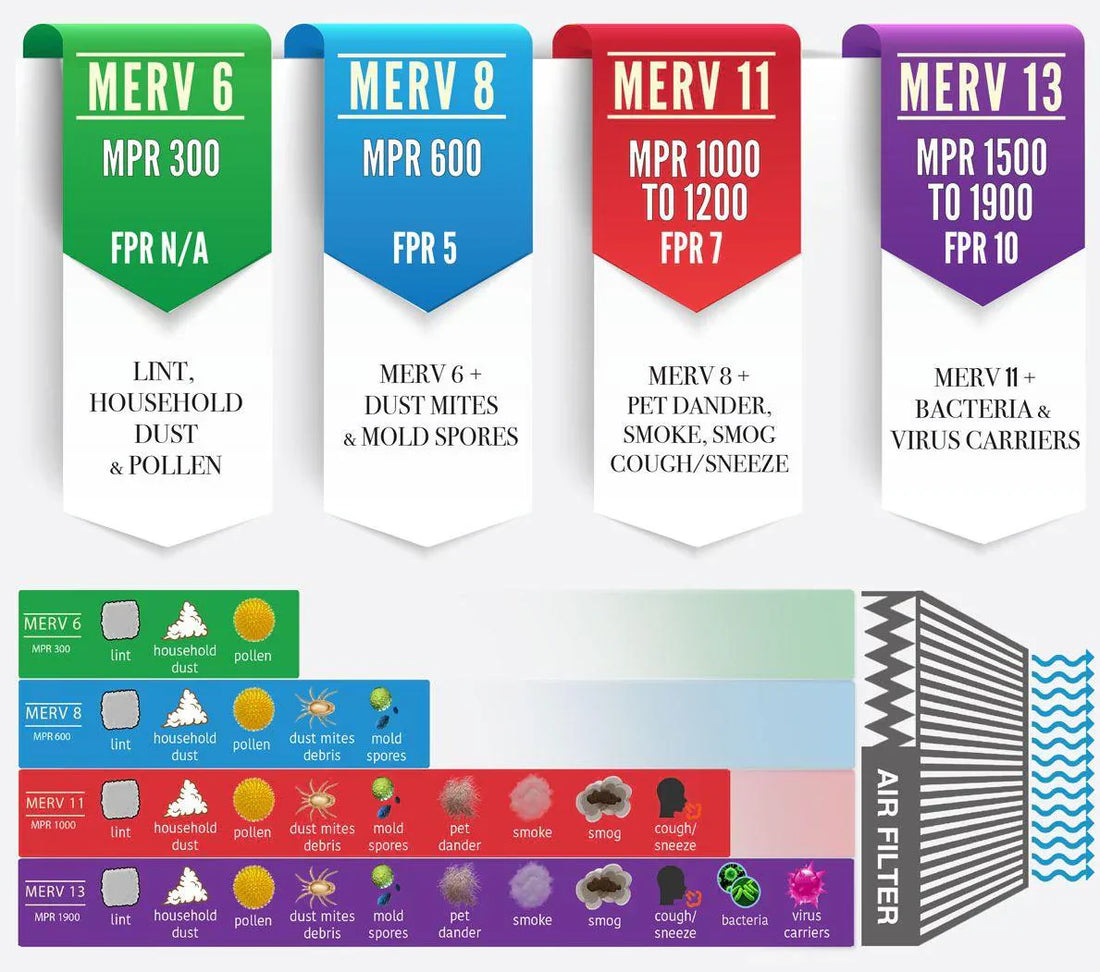
A Guide to Choosing the Right MERV Rating for Your Furnace Filter
When it comes to maintaining your home's HVAC system, selecting the right furnace filter is crucial for ensuring both air quality and system efficiency. One of the key factors in choosing a furnace filter is its MERV rating, which stands for Minimum Efficiency Reporting Value. This rating system, developed by the American Society of Heating, Refrigerating, and Air-Conditioning Engineers (ASHRAE), helps measure the effectiveness of air filters in capturing airborne particles. In this guide, we'll explore what MERV ratings mean, how they impact your HVAC system, and how to choose the right MERV rating for your needs.
Understanding MERV Ratings
The MERV rating scale ranges from 1 to 16, with higher numbers indicating better filtration performance. Here's a breakdown of what different MERV ratings can capture:
- MERV 1-4: These filters are basic and capture large particles like pollen, dust mites, and carpet fibers. They are typically used in residential window air conditioning units and are not recommended for furnace systems due to their low efficiency.
- MERV 5-8: These filters capture finer dust particles, including mold spores and pet dander. They are suitable for general residential use and provide a moderate level of filtration.
- MERV 9-12: These filters offer better filtration, capturing most dust particles and are suitable for general home use. They provide a good balance between filtration and airflow.
- MERV 13-16: These filters capture even smaller particles, including smoke and soot, making them ideal for environments requiring high air quality standards, such as hospitals or homes with severe allergy sufferers.
How MERV Ratings Affect Your HVAC System
While higher MERV ratings provide better air filtration, they also increase resistance to airflow. This can strain your HVAC system, potentially leading to higher energy bills and reduced system lifespan if not properly managed.
Airflow and Efficiency
Higher MERV filters are denser and more restrictive, which means they can reduce airflow through your system. This is particularly important if your HVAC system is older or not designed to handle higher resistance filters. For instance, a MERV 13 filter may restrict airflow more than a MERV 8 filter, forcing your furnace to work harder.
System Compatibility
Before choosing a higher MERV filter, ensure your HVAC system can handle it. Check your system's manual for recommended MERV ratings. Using a filter with too high a MERV rating can damage your system over time.
Choosing the Right MERV Rating for Your Home
The ideal MERV rating for your home depends on several factors:
- Air Quality Needs: If you or a family member suffers from allergies, a higher MERV rating (11 or 13) might be necessary to capture allergens like pollen and pet dander.
- Budget: Higher MERV filters are generally more expensive. Balance your air quality needs with your budget.
- HVAC System Capability: Ensure your system can handle the increased resistance of higher MERV filters.
- Location and Lifestyle: If you live in an area with high pollution or have pets, a higher MERV rating can be beneficial.
Common MERV Ratings for Homes
- MERV 8: Suitable for general residential use, capturing most dust particles and providing moderate filtration. - MERV 11: Offers better filtration, capturing particles between 1 and 3 microns, including bacteria and viruses. It's a good choice for homes with allergy sufferers. - MERV 13: Captures even smaller particles, down to 0.3 microns, making it ideal for homes requiring high air quality standards.
Conclusion
Choosing the right MERV rating for your furnace filter is a balance between air quality needs and HVAC system compatibility. While higher MERV ratings provide superior filtration, they can also restrict airflow and strain your system. For most homes, a MERV rating between 8 and 13 strikes a good balance between filtration efficiency and system performance. Always consider your specific needs and ensure your HVAC system can handle the chosen filter's resistance to maintain optimal performance and longevity.
Additional Tips for Maintaining Your Furnace Filter:
- Regular Replacement: Replace your furnace filter regularly to prevent clogging and maintain airflow. The frequency depends on usage and manufacturer recommendations.
- Monitor Air Quality: Keep an eye on indoor air quality and adjust your MERV rating as needed.
- Consult a Professional: If unsure about the best MERV rating for your system, consult with an HVAC professional.
By following these guidelines and understanding the role of MERV ratings, you can ensure your home has clean air while maintaining the efficiency and longevity of your HVAC system.
At DanTheFilterMan.com, we're committed to helping you find the best solutions for your HVAC needs. Whether you're looking for advice on furnace filters or need assistance with maintenance, feel free to reach out to us today!


